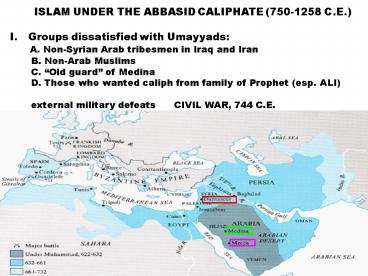ISLAM UNDER THE ABBASID CALIPHATE 7501258 C.E. - PowerPoint PPT Presentation
1 / 14
Title:
ISLAM UNDER THE ABBASID CALIPHATE 7501258 C.E.
Description:
B. Buyids (Buwayhids) from N. Iran occupy Baghdad 945 C.E. ... (2) Seljuk Turks (part of Oghuz) take Baghdad, 1055, recognize. Abbasid caliph; staunchly Sunni. ... – PowerPoint PPT presentation
Number of Views:1020
Avg rating:3.0/5.0
Title: ISLAM UNDER THE ABBASID CALIPHATE 7501258 C.E.
1
- ISLAM UNDER THE ABBASID CALIPHATE (750-1258
C.E.) - Groups dissatisfied with Umayyads
- A. Non-Syrian Arab tribesmen in Iraq and
Iran - B. Non-Arab Muslims
- C. Old guard of Medina
- D. Those who wanted caliph from family of
Prophet (esp. ALI) - external military defeats CIVIL WAR,
744 C.E.
2
II. Abbasid revolution A. Caliph from line
of Prophets uncle Abbas (?Abbasid) in
context of vague call for restoration of
caliphate to family of Prophet
B. 30-year underground missionary movement aimed
at eastern Iran, led by ABU MUSLIM
C. Messianic expectations in E. Iran black
banners III. Conquest (750) and renunciation of
Shicism Shicites recognized separate line
of caliphs descended from ALI ( first
caliph, according to Shicites)
3
IV. New Abbasid capital BAGHDAD (762)
Tigris R.
plan of original round city
4
A. 9th c. commercial and cultural
center B. Classical Islam law, govt., and
learning in full flower C.
Translation of Greek scientific and
philosophical works
(Dioscorides)
miniature from Dioscorides Materia Medica
(painted in Mosul, Iraq, 1228)
5
a ship in the Indian Ocean from the Maqamat of
al-Hariri (10th century, illustration from 13th
c.)
6
V. Weakening of Abbasid authority A. Regional
autonomies in Iran and N. Africa by late 9th c.
B. Buyids (Buwayhids) from N. Iran occupy
Baghdad 945 C.E., continue to recognize
Abbasid caliph.
Oxus R.
BYZANTINES
Baghdad
FATIMIDS
7
C. Turkic migrations (1) Oghuz
confederation crosses Oxus River, 11th c.
(2) Seljuk Turks (part of Oghuz) take Baghdad,
1055, recognize Abbasid caliph
staunchly Sunni.
Oxus R.
BYZANTINES
Baghdad
FATIMIDS
Cairo
8
15th-century painting of
Turkish nomadic camp
9
D. FATIMIDS Shicite counter-caliphate in
Egypt/Syria/Arabia capital CAIRO (founded
969) Seljuks defend against Shicite threat.
Fatimid coins
Abbasid coins
Mosque of Aqmar, Cairo (1125)
10
E. Symbiotic relationship Abbasid caliph
religious authority/ Seljuk SULTAN
military/political authority F. Regional court
cultures in Iran Persian
Seljuk ceramics from 12th-century Iran
11
G. Mamluks elite military slaves imported into
Islamic lands, converted, and trained
(1) Turkish military and equestrian skills
Turkish short bow
12
(2) 9th-century Abbasid caliph builds new capital
N. of Baghdad (Samarra) for Turkish mamluks
Samarra
13
(3) Turkish mamluks in palace intrigue
mosque of caliph al-Mutawakkil (r. 847-61),
Samarra
14
VI. Abbasid-era religious developments A.
Shicism takes definitive form. B. Four
Sunni legal rites develop. C. Mystical
(sufi) orders
Mevlevi sufis, a.k.a. whirling dervishes































